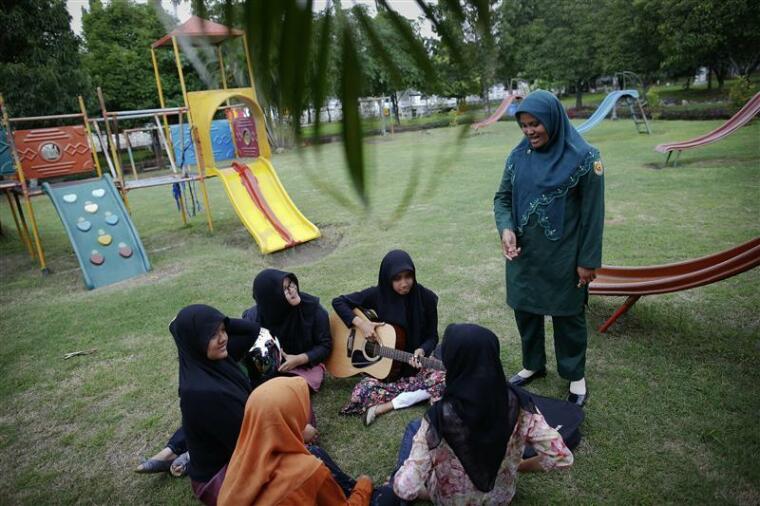Indiana school draws backlash from parents over worksheet portraying Sharia in positive light

Parents in Southern Indiana have expressed their disapproval of a worksheet that purportedly portrays Sharia or Islamic law in a positive light.
The worksheet, which was assigned to seventh-graders at Highland Hills Middle School, features a passage written by a fictional 20-year-old woman from Saudi Arabia named Ahlima, according to a report by the Courier-Journal.
In the worksheet, Ahlima stated that she feels "very fortunate" to live under Sharia in Saudi Arabia, and she explained how she will soon become a man's second wife.
"I understand that some foreigners see our dress as a way of keeping women from being equal, but ... I find Western women's clothing to be horribly immodest," the worksheet read.
Dean Hohl, one of the parents who attended a meeting with New Albany-Floyd County's school board regarding the issue, said that the way Sharia was presented on the worksheet was "like describing how effective Hitler was at nationalizing Germany and creating patriotism but leaving out that he slaughtered 6 million Jews," he said.
Jon Baker, whose daughter also received the assignment, said that the document is "almost propaganda." Baker added, "If you read that, you would think everything's wonderful in that world."
Bill Briscoe, a spokesman for the district, announced that the curriculum is currently being reviewed after hearing the complaints.
Hohl said that he often travels to Malaysia, where Sharia is in effect in the judicial system, according to the CIA World Factbook. He said that he does not have a problem with Islam, and he wants his daughter to learn the difference between moderate Muslims and extremists.
"Let's tell the whole truth. Let's help people understand what's really happening and what the rest of the world is like so when they are interacting with the rest of their global peer group, we can reduce the likelihood of conflict and misunderstanding," he said.
In some versions of Sharia, women can be stoned to death for adultery or be punished for leaving home unaccompanied by her husband, father or closest male relative.
The worksheet, created by InspirEd Educators Inc., also became a source of controversy in 2011, when it was used at a middle school in Smyrna, Georgia.
Sharon Coletti, the president of InspirEd Educators and the creator of the document, said that she was accused of "indoctrinating" children and that she received death threats at the time.
She said that the lesson was developed over 20 years ago when the state's social studies standards required middle school students to learn about Middle Eastern culture. She noted that Ahlima, the character in the worksheet, was based on a woman who was interviewed for a news report about her opinion on Sharia.
Coletti said that the worksheet will be removed from the curriculum because of the unwanted media attention.
 Christians don't have to affirm transgenderism, but they can’t express that view at work: tribunal
Christians don't have to affirm transgenderism, but they can’t express that view at work: tribunal Archaeology discovery: Medieval Christian prayer beads found on Holy Island
Archaeology discovery: Medieval Christian prayer beads found on Holy Island Presbyterian Church in America votes to leave National Association of Evangelicals
Presbyterian Church in America votes to leave National Association of Evangelicals Over 50 killed in 'vile and satanic' attack at Nigerian church on Pentecost Sunday
Over 50 killed in 'vile and satanic' attack at Nigerian church on Pentecost Sunday Ukrainian Orthodox Church severs ties with Moscow over Patriarch Kirill's support for Putin's war
Ukrainian Orthodox Church severs ties with Moscow over Patriarch Kirill's support for Putin's war Islamic State kills 20 Nigerian Christians as revenge for US airstrike
Islamic State kills 20 Nigerian Christians as revenge for US airstrike Man who served 33 years in prison for murder leads inmates to Christ
Man who served 33 years in prison for murder leads inmates to Christ


 Nigerian student beaten to death, body burned over ‘blasphemous’ WhatsApp message
Nigerian student beaten to death, body burned over ‘blasphemous’ WhatsApp message 'A new low': World reacts after Hong Kong arrests 90-year-old Cardinal Joseph Zen
'A new low': World reacts after Hong Kong arrests 90-year-old Cardinal Joseph Zen Iran sentences Christian man to 10 years in prison for hosting house church worship gathering
Iran sentences Christian man to 10 years in prison for hosting house church worship gathering French Guyana: Pastor shot dead, church set on fire after meeting delegation of Evangelicals
French Guyana: Pastor shot dead, church set on fire after meeting delegation of Evangelicals ‘Talking Jesus’ report finds only 6% of UK adults identify as practicing Christians
‘Talking Jesus’ report finds only 6% of UK adults identify as practicing Christians Mission Eurasia ministry center blown up in Ukraine, hundreds of Bibles destroyed: 'God will provide'
Mission Eurasia ministry center blown up in Ukraine, hundreds of Bibles destroyed: 'God will provide' Church holds service for first time after ISIS desecrated it 8 years ago
Church holds service for first time after ISIS desecrated it 8 years ago Burger King apologizes for 'offensive campaign' using Jesus' words at the Last Supper
Burger King apologizes for 'offensive campaign' using Jesus' words at the Last Supper Uganda: Muslims abduct teacher, burn him inside mosque for praying in Christ’s name
Uganda: Muslims abduct teacher, burn him inside mosque for praying in Christ’s name